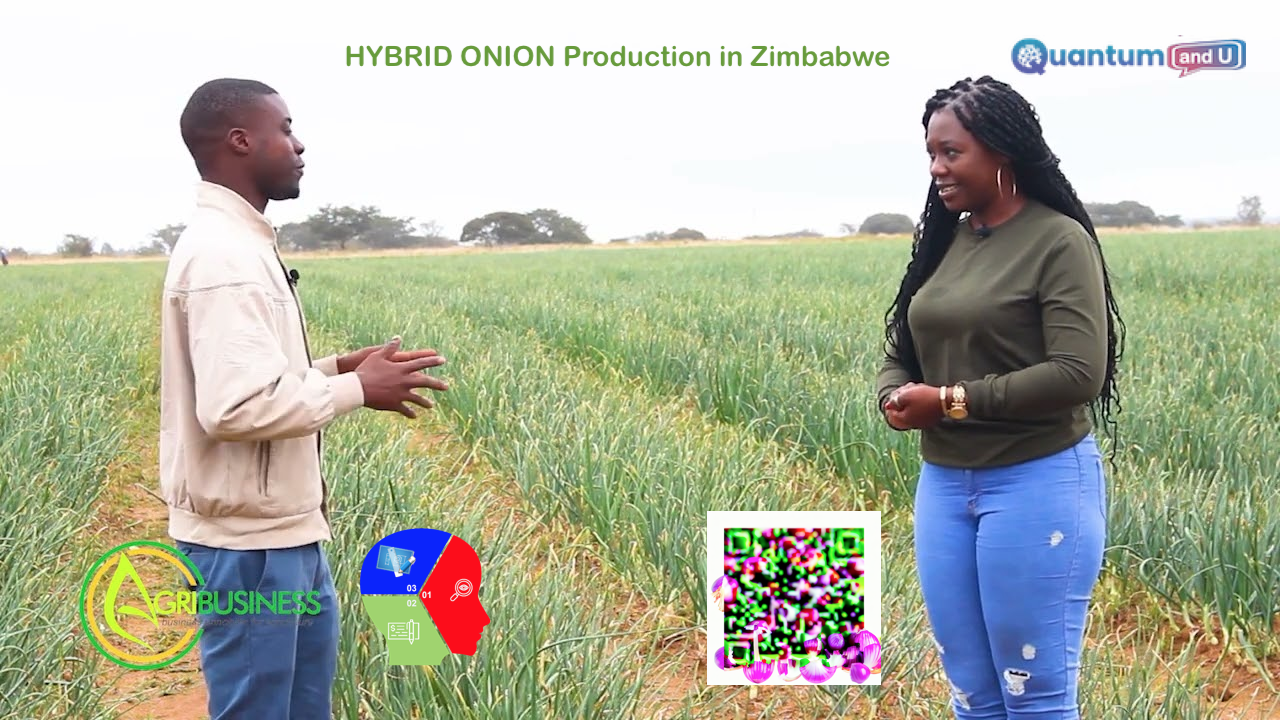
Introduction:
Welcome to our YouTube review on the agricultural innovation in Zimbabwe, focusing on hybrid onion farming. Zimbabwe, known for its rich agricultural history, is progressing to strengthen its local agricultural sector and reduce reliance on imports. The host, introduces us to the “Agricultural New Directions Agribusiness” program. This initiative fosters collaboration within Zimbabwe’s farming community, promoting the exchange of innovative farming techniques and business ideas. Today’s discussion revolves around the potential of hybrid king onions in transforming Zimbabwean agriculture. These onions, cultivated for Zimbabwe’s unique environment, show promising results in their early stages. We detail their cultivation process in Marondera, a farming town in Mashonaland East province known for its fertile land and optimal climate. We discuss how these onions can significantly cut Zimbabwe’s import bill and explore the economic benefits of hybrid onion farming, like creating employment opportunities and boosting GDP. Join us as we delve into Zimbabwe’s agricultural sector and the process of hybrid onion production, highlighting its strides towards self-sustainability with a focus on hybrid king onions in Marondera. We’ll explore how innovation and tradition are shaping a sustainable future for Zimbabwe’s agriculture.
Zimbabwe Agriculture info:
Agriculture is the backbone of Zimbabwe’s economy, contributing 8.85% of the country’s GDP in 2021. It is the largest employer in the country, providing jobs for about 60-70% of the population. Agriculture also supplies 60% of the raw materials required by the industrial sector and contributes 40% of total export earnings. The main agricultural products in Zimbabwe are maize, tobacco, cotton, wheat, soybeans, and sugar. Maize is the staple food crop, and tobacco is the country’s main export crop. Other important agricultural products include livestock, fruits, and vegetables. The agricultural sector in Zimbabwe has faced a number of challenges in recent years, including drought, political instability, and economic sanctions. However, the government has taken steps to address these challenges, and the agricultural sector is expected to grow in the coming years.
In 2022, Zimbabwe registered its largest wheat harvest in history, with a production of 375,000 tons. This was made possible by a number of factors, including favorable weather conditions, government support, and increased investment in the agricultural sector. The government of Zimbabwe has set a goal of making the country self-sufficient in food production by 2030. To achieve this goal, the government is investing in irrigation, agricultural research, and extension services. The government is also encouraging farmers to adopt modern agricultural practices. The agricultural sector is a key driver of economic growth in Zimbabwe. By investing in the agricultural sector, the government can help to create jobs, reduce poverty, and improve food security.
Where is Zimbabwe:
The review starts with an introduction to Zimbabwe’s agricultural landscape, highlighting the country’s efforts to enhance local production and reduce imports.
Related Sections:
- Nursery Setup and Preparation:
Tinashe Rodney Chitway, from Mukuta Farm, shares insights into the establishment process. The nursery setup began in January, using 10 kg of hybrid onion seeds, specifically the Dinner variety. The host discusses soil preparation, the use of fertilizers like compound C, ammonium nitrate, and gypsum to ensure optimal growth in the nursery. - Soil Requirements and Fertilizer Application:
The review explores the importance of loose soil for onion production, emphasizing that compacted soil can also be managed effectively. The interviewee stresses the significance of setting up your own nursery to save costs. Proper fertilizer application is explained, focusing on the correct amounts of compound C, SSP, and gypsum, along with top dressings for successful growth. - Water Management and Irrigation:
Tinashe explains the irrigation method used on the farm—overhead irrigation via a center pivot. The frequency of irrigation and the amount of water applied per week are discussed, highlighting the importance of appropriate watering for onion growth. - Management, Pest, and Disease Control:
The discussion covers the labor-intensive process of transplanting onions and the importance of skilled labor. The interviewee explains various diseases and pests that affect onion crops, such as leaf blotch and thrips. Solutions to combat these challenges are also provided, including the use of certain pesticides. - Market and Profitability:
The review touches on the market aspects of onion production, discussing the profitability of growing onions. The presenter explains how onions can be sold both as fresh produce and dried, with different market windows. The labor-intensive nature of onion farming and its potential profitability are highlighted.
Conclusion:
The host wraps up the review by emphasizing the significance of maintaining strong relationships with agronomists for expert guidance. They discuss the potential of onion farming to contribute to the economy, addressing issues like trade imbalance and food security. The interviewee also underscores the importance of government support and encourages farmers to embrace onion production as a viable venture.
Key Takeaways:
- Hybrid onion production is a promising solution to reduce import bills in Zimbabwe.
- Setting up your own nursery can significantly cut production costs.
- Proper soil preparation and fertilizer application are crucial for successful onion cultivation.
- Skilled labor and disease control are essential for high-yield onion production.
- Onions can be sold both fresh and dried, offering diverse market opportunities.
- Collaborating with agronomists and embracing onion farming can contribute to economic growth.
References:


